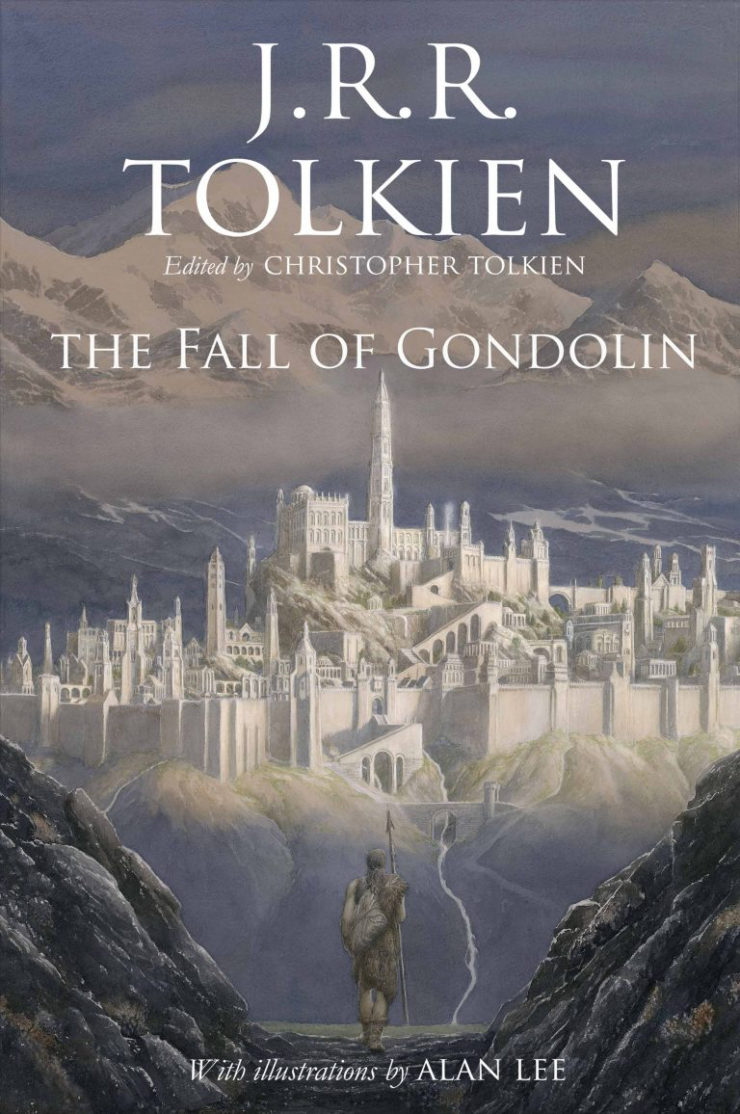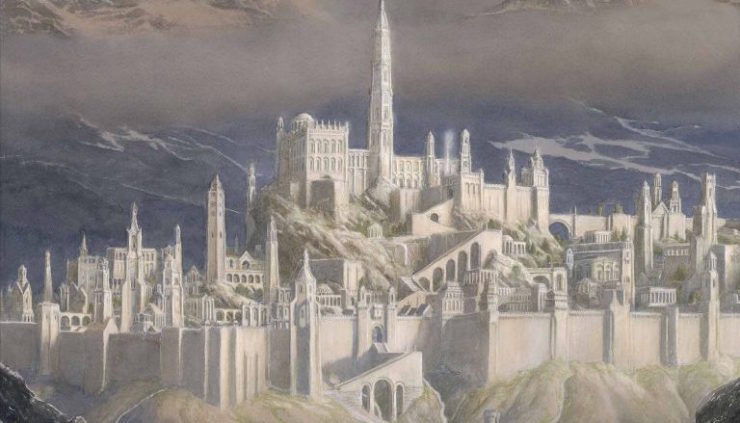HarperCollins UK announced today that it would publish The Fall of Gondolin, J.R.R. Tolkien’s tale documenting the rise of a great but hidden Elven kingdom and its terrible fall, for the first time as a standalone edition. Edited by Christopher Tolkien using the same “history in sequence” mode that he did for 2017’s standalone edition of Beren and Lúthien, and illustrated by Alan Lee, this edition will collect multiple versions of the story together for the first time.
Tolkien has called this story, which he first began writing in 1917, “the first real story of this imaginary world”; i.e., it was one of the first tales to be put to paper. The only complete version of The Fall of Gondolin was published posthumously in The Book of Lost Tales; however, different compressed versions appeared in both The Silmarillion and the collection Unfinished Tales of Númenor and Middle-earth.
Taking place millennia before the events of The Lord of the Rings, The Fall of Gondolin marks the beginning of the end of the First Age, or Elder Days, of Middle-earth. Alongside The Children of Húrin and Beren and Lúthien, it is considered one of the three “Great Tales” of that time period. The official synopsis, from HarperCollins UK:
In the Tale of The Fall of Gondolin are two of the greatest powers in the world. There is Morgoth of the uttermost evil, unseen in this story but ruling over a vast military power from his fortress of Angband. Deeply opposed to Morgoth is Ulmo, second in might only to Manwë, chief of the Valar.
Central to this enmity of the gods is the city of Gondolin, beautiful but undiscoverable. It was built and peopled by Noldorin Elves who, when they dwelt in Valinor, the land of the gods, rebelled against their rule and fled to Middle-earth. Turgon King of Gondolin is hated and feared above all his enemies by Morgoth, who seeks in vain to discover the marvellously hidden city, while the gods in Valinor in heated debate largely refuse to intervene in support of Ulmo’s desires and designs.
Into this world comes Tuor, cousin of Túrin, the instrument of Ulmo’s designs. Guided unseen by him Tuor sets out from the land of his birth on the fearful journey to Gondolin, and in one of the most arresting moments in the history of Middle-earth the sea-god himself appears to him, rising out of the ocean in the midst of a storm. In Gondolin he becomes great; he is wedded to Idril, Turgon’s daughter, and their son is Erendel, whose birth and profound importance in days to come is foreseen by Ulmo.
At last comes the terrible ending. Morgoth learns through an act of supreme treachery all that he needs to mount a devastating attack on the city, with Balrogs and dragons and numberless Orcs. After a minutely observed account of the fall of Gondolin, the tale ends with the escape of Tuor and Idril, with the child Erendel, looking back from a cleft in the mountains as they flee southward, at the blazing wreckage of their city. They were journeying into a new story, the Tale of Erendel, which Tolkien never wrote, but which is sketched out in this book from other sources.
Following his presentation of Beren and Lúthien Christopher Tolkien has used the same ‘history in sequence’ mode in the writing of this edition of The Fall of Gondolin. In the words of J.R.R. Tolkien, it was the first real story of this imaginary world’ and, together with Beren and Lúthien and The Children of Húrin, he regarded it as one of the three ‘Great Tales’ of the Elder Days.
The cover:

“We never dared to dream that we would see this published,” Tolkien Society chair Shaun Gunner said in a statement. “The Fall of Gondolin is, to many in the Tolkien community, the Holy Grail of Tolkien texts as one of Tolkien’s three Great Tales alongside The Children of Húrin and Beren and Lúthien. This beautiful story captures the rise and fall of a great Elven kingdom, taking place millennia before the events of The Lord of the Rings. This book brings all the existing work together in one place to present the story in full.”
The Fall of Gondolin will be published August 30 in both the US (Houghton Mifflin Harcourt) and UK (HarperCollins UK). In addition, the official Tolkien Calendar, which will feature paintings from The Fall of Gondolin, will be published on the same day.











I’d love to read a version of this story, especially given how close it was to Tolkien’s heart. However, I really wonder where the component materials will come from. The relevant chapter of the Silmarillion is bald, and the only mature treatment of the story (from Unfinished Tales) is one of my favorite pieces of Tolkien’s writing but cuts out long before the actual battle and fall of the city. Is there enough polished writing to make this work from beginning to end? The textual situation is much more fragmentary than “The Children of Hurin” or “Beren and Luthien”.
At last! I’ve been waiting for this ever since Children of Húrin.
It’s bound to be great, but it’s also looking like it’ll much more like Beren and Lúthien than like The Children of Húrin. So yes, quite fragmented and spliced. But I cannot wait for that new artwork. I’d really love to see a new Alan Lee Balrog.
@3
Damn, I really enjoyed Children of Hurin, but Beren and Luthien was a little difficult to read with the different versions put into the book. I was hoping this would be more of a cohesive and fluid story. I’m sure I’ll still buy it though.
Basically all this material is in the HOME. Granted it’s convenient to have the various versions collected in one book but I’m cheap.
I can only assume The Fall of Gondolin will include the Lost Tales account. Which Tolkien wrote after experiencing the Hellish battle of the Somme and which may have helped him process that experience.
I’m sort of surprised-not-surprised by the way the Tolkien estate has been green-lighting all these stand-alone re-editions of stories from the Silmarillion (I know, they are older than the published Silmarillion, but you get the idea). Given that even lucrative publishing engines are nowhere near the audiovisual industries, I was wondering if this “trend” (I put it between cuotation marks, since it’s been ony two works so far), maybe has something to do with the possibility of selling these stories for adaptation on their own. It’s always been said the Silmarillion is not really adaptable given its structure and so on… but if you could isolate more neatly some of its most powerfull (and structurally adaptable) substories? I wonder if the publishers’ aim isn’t really to offer us Tolkien fans (and newcommers) new ways to enjoy old tales, but to pave the way to keep making Middle Earth adaptations.
I know it’s pedantic, but what do you expect from Tolkien fans?
“the tale ends with the escape of Turin and Idril, with the child Earendel”
That’d be Tuor, Bob.
The fall of Gondolin from lost tales 2 is one of my favorite Tolkien stories. I have often fantasized about a mini series style screen adaptation based on the version in lost tales 2 (the only complete version as far as I know.) With this publication, my dream is one step closer to reality!
@1: There 4 versions of the story in total:
“The Fall of Gondolin” – written by JRRT in 1917 and revised in 1920. Previously published in The Book of Lost Tales, Part II (The History of Middle-earth, Book 2, 1984). The only complete, detailed account of the battle but written in a very archaic style and completely out of keeping with the later versions of the Middle-earth legendarium. This version of the story has flamethrowers and tanks and the elves are called “Gnomes” (which Tolkien thought was an awesome name until the garden gnome craze of the 1930s, when he changed the name to “Elves”).
“The Lay of the Fall of Gondolin” – a 120-verse poem about the battle, written in the 1920s. Published in The Lays of Beleriand (The History of Middle-earth, Book 3, 1985).
“Of Tuor and the Fall of Gondolin” – a very brief (9 page) summary of the battle, written in the 1930s as part of The Grey Annals of Beleriand and included as Chapter 23 of The Silmarillion (1977) proper.
“Of Tuor and His Coming to Gondolin” – a very detailed account of the story, written in a much more similar mode to The Lord of the Rings. Written in 1951 when LotR was complete but when its publication appeared dubious. Tolkien abruptly stopped writing it after 34 pages (when Tuor had just reached the city gates and met Ecthelion) for reasons never explained. He never got back to the story.
I assume this book will include all of these versions.
silmarillion saga of movies using all the notes of Christopher Tolkien including this book.
make it happen
@6 I doubt it. CT’s behind these books and he’s famously opposed to any new adaptations.
@11: Not anymore, though. Christopher having stepped down. When it comes to negotiating rights for adaptations, I don’t think he’ll have much to do with it anymore.
I hope it will contain everything, which the Beren and Luthien book did not. Parts of the ‘Lay” are missing in that book. I kept looking for the poetic bit where they meet, and it isn’t there – it cuts from Beren crossing into Belerian/fairyland to Nargothrond.
Film 1: The Rebellion of the Noldor
Film 2: Beren and Luthien
Film 3: The Children of Hurin
Film 4: The Fall of Gondolin
Film 5: The Voyage of Earendil/War of Wrath
I was just reading the latest bit of the Silmarillion Primer yesterday, lightly grieving that The Fall Of Gondolin would never come to be.
A shame it won’t be the CoH treatment, but I’ll snaffle this up nonetheless. Who knows, perhaps CT will give his blessing to Amazon to take a run at this story (although I am rather crossing my fingers for CoH).
@14: add an in-between/anthology film about Eöl, and I’m sold.
Mostly though, I am just waiting to see The Leap Of Beren on celluloid.
/digression
Smudgeon, as it happens, the Silmarillion Primer tackles the Eöl later today. Stay tuned. :)
@9 “Changed to Elves” isn’t quite accurate. The race they’re a subset of were always called Elves. Gnomes was just a common name for the Elves officially called Noldoli in early versions. Later they became Noldor, and the Gnome name was shelved.
@12 I’m sure there will be adaptations, and the existence of the standalone books will facilitate that. I just don’t believe that was the intent behind them. Because CT.
Man, I still haven’t gotten around to Beren and Luthien, although it’s good to have a heads up that neither of these are done in the exact same way of Children of Hurin. I’ve been dragging my feet since I do own all of the HOME and so with nothing new, I’m not sure if it’s worth it, but the artwork sounds lovely and it’s nice to have a concise volume.
@12, it still seems safe to assume that Christopher Tolkien is very much not producing these editions with adaptation in mind. It might well make it easier for the rights for these individual stories to eventually be sold, but I think we can be pretty sure that’s not the intent here.